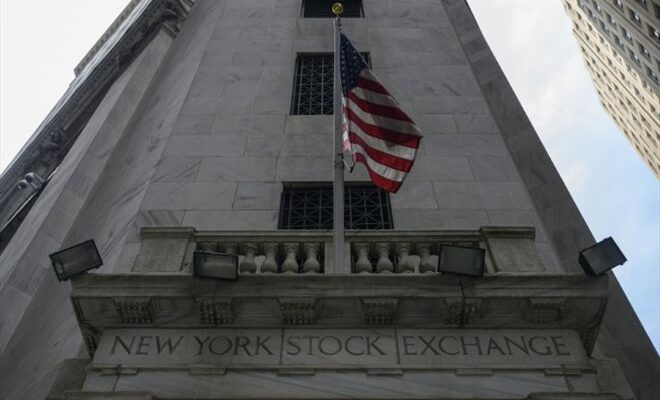The facade of the New York Stock Exchange (AFP/ANGELA WEISS)
The New York Stock Exchange ended lower on Wednesday, scalded by the rise in bond rates and the slow progress of discussions on the American debt, in a context of general caution.
The Dow Jones fell 0.77%, the Nasdaq index fell 0.61% and the broader S&P 500 index fell 0.73%.
Eight days before a possible default by the United States, the negotiations between the White House and the Republican parliamentary opposition continue to reach an increase in the debt ceiling, but without significant progress on Wednesday.
US President Joe Biden has said he is ready for a framework for public spending, which would reduce it by a trillion dollars over ten years compared to the trajectory initially planned.
His main interlocutor, Republican Speaker of the House of Representatives Kevin McCarthy, said he was optimistic about the outcome of the talks but showed no sign of inflection.
“We all know what will happen,” commented Maris Ogg, of Tower Bridge Advisors, for whom the United States will avoid default. “The only question is whether there is an agreement or whether they postpone the deadline” by adopting a text that leaves more time for discussions.
Even if the worst is avoided, “you are going to have a lot of debt issues” in the weeks and months to come, to catch up with those that have not been able to take place in recent months, she argues.
This influx of Treasuries should unbalance supply versus demand, drive down the price of US government bonds and force the government to offer higher rates.
It is this anticipation that partly justifies the tensions experienced by the bond market. On Wednesday, the yield on 10-year US government bonds thus stood at 3.74%, against 3.69% the day before closing.
The other element of explanation is due to the minutes of the last meeting of the American central bank (Fed), published on Wednesday, which confirms that its members are in favor of keeping rates high in the medium term.
“Wall Street took two punches” that kept it in the red, where it had been since opening, Oanda’s Edward Moya concluded in a note.
This environment of high interest rates is, in fact, negative for the equity market, which until recently was hoping for a monetary turnaround and several falls by the end of the year.
A series of well-made publications in the distribution sector did not improve the mood of investors.
© 2023 AFP
Did you like this article ? Share it with your friends with the buttons below.




